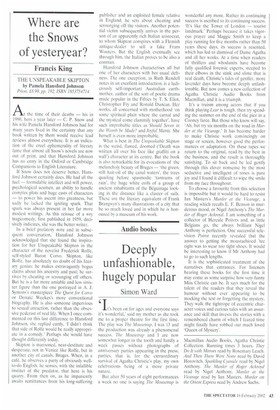Where are the Snows of yesteryear?
Francis King
THE UNSPEAKABLE SKIPTON by Pamela Hansford Johnson Prion. £8.99, pp. 192, ISBN 1853754714 At the time of their deaths — his in 1980, hers a year later — C. P. Snow and his wife Pamela Hansford Johnson had for many years lived in the certainty that any book written by them would receive lead reviews almost everywhere. It is an indication of the cruel ephemerality of literary fame that almost all Snow's novels are now out of print, and that Hansford Johnson has no entry in the Oxford or Cambridge Companions to English Literature.
If Snow does not deserve better, Hansford Johnson certainly does. He had all the fuel — formidable intellect and will power, psychological acumen. an ability to handle complex plots and huge casts of characters — to power his ascent into greatness, but sadly he lacked the igniting spark. That spark was always present in her far more modest writings. As this reissue of a wry tragicomedy, first published in 1959, decisively indicates, she was the better writer.
In a brief prefatory note and in subsequent conversation, Hansford Johnson acknowledged that she found the inspiration for her Unspeakable Skipton in the character of the novelist Frederick Rolfe, self-styled Baron Corvo. Skipton, like Rolfe, has absolutely no doubt of his literary genius: he makes extravagantly bogus claims about his ancestry and past; he survives by cheating or scrounging off others. But he is a far more amiable and less sinister figure than the one portrayed in A. J. Symons's masterpiece The Quest for Como or Donald Weekes's more conventional biography. He is also someone impervious to sexual attraction, rather than the obsessive pederast of real life. When I once commented on this last difference to Hansford Johnson, she replied curtly, 'I didn't think that side of Rolfe would be really appropriate in a comedy.' Perhaps she would have thought differently today.
Skipton is marooned, near-destitute and desperate, not in Venice like Rolfe, but in another city of canals, Bruges. When, in a café, he observes a party of obviously wellto-do English. he senses, with the infallible instinct of the predator, that here is his quarry. From then on, as he impatiently awaits remittances from his long-suffering publisher and an exploited female relative in England. he sets about cheating and scrounging off the visitors. Another potential victim subsequently arrives in the person of an apparently rich Italian aristocrat, to whom Skipton conspires with a Flemish antique-dealer to sell a fake Frans Wouters. But the English eventually see through him, the Italian proves to be also a co nm an.
Hansford Johnson characterises all but one of her characters with her usual deftness. The one exception, as Ruth Rendell notes in an excellent introduction, is a ludicrously self-important Australian earthmother, author of the sort of poetic drama made popular in the Fifties by T, S. Eliot, Christopher Fry and Ronald Duncan. Her works, all concerned with motherhood on some spiritual plain where the carnal and the mystical come clammily together', have such improbable titles as Should Seven in the Womb be Made? and Joyful Matrix. She herself is even more improbable.
What is best in The Unspeakable Skipton is the weird, flawed, doomed ('Death was written all over his face like graffiti on a wall') character at its centre. But the book is also remarkable for its evocations of the melancholy beauty of Bruges — the green, still hair-oil of the canal waters', the trees quailing before spasmodic 'tantrums of rain', the huge white coifs of a group of ancient inhabitants of the Beguinage looking in the distance like a cluster of sails. These are the literary equivalent of Frank Brangwyn's many illustrations of a city that he so much loved and in which he is honoured by a museum of his work.




































































 Previous page
Previous page